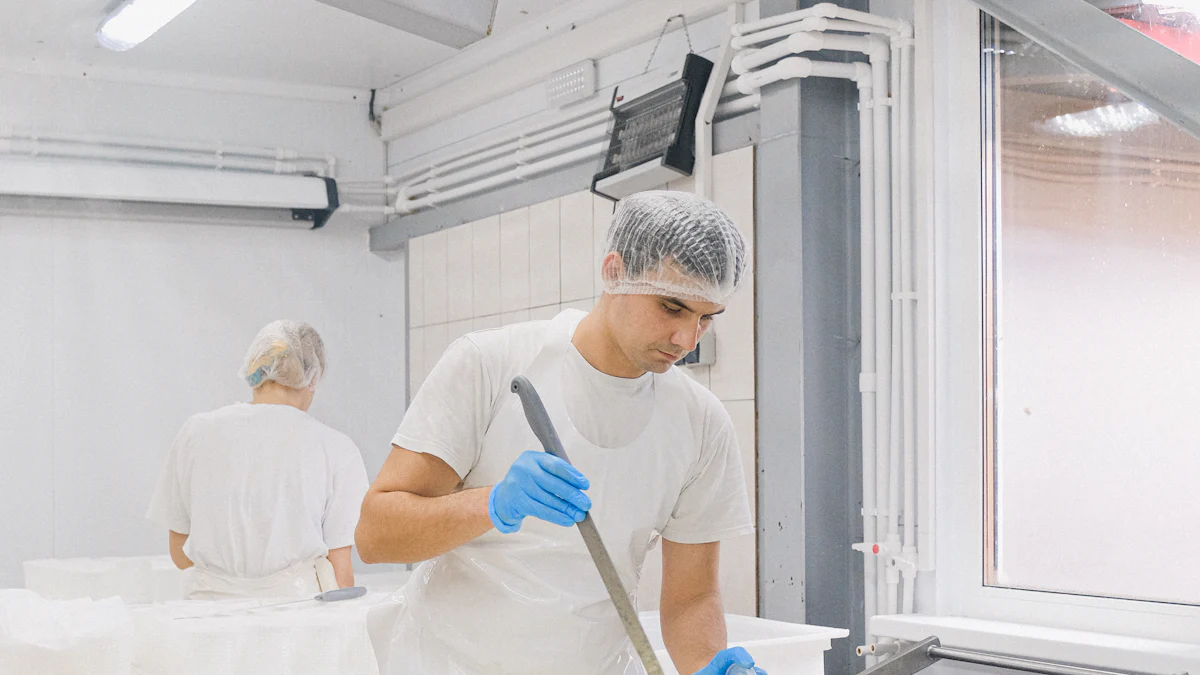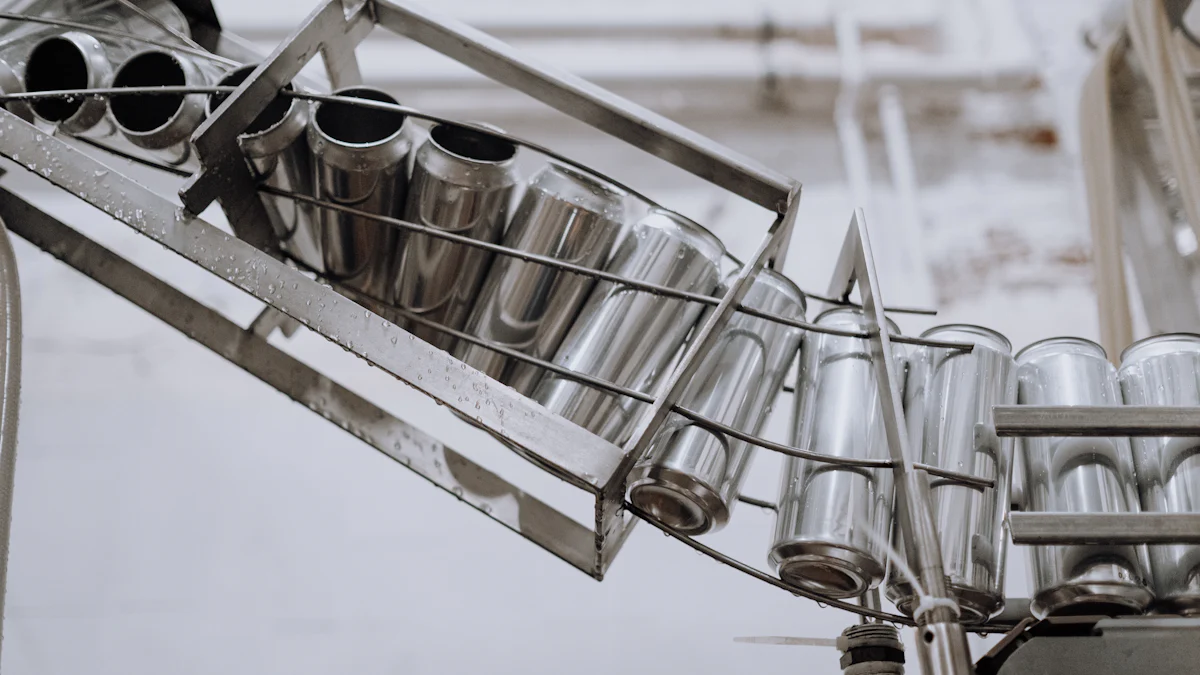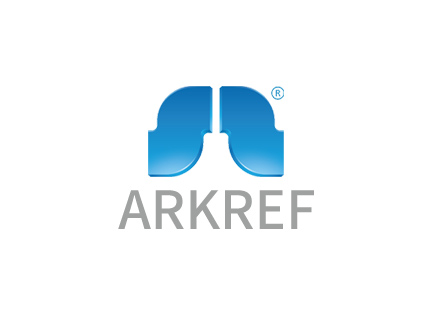The difference between a tunnel freezer and a spiral freezer

Tunnel freezers and spiral freezers play crucial roles in the food processing industry. Each type offers unique advantages tailored to specific industrial needs. Tunnel freezers, known for their linear design, excel in high-volume operations, rapidly freezing large quantities of products. In contrast, spiral freezers, with their compact, multi-tiered structure, efficiently freeze perishable goods while saving space. Choosing the right freezer impacts operational efficiency and product quality. Understanding these differences helps industries make informed decisions, ensuring optimal performance and cost-effectiveness.
Definition and Functionality
What is a Tunnel Freezer?
Description of design and operation
A tunnel freezer is an advanced industrial machine designed for rapid and uniform freezing. It operates by moving products through a long, linear conveyor system within a controlled environment. This setup ensures that each item receives consistent exposure to cold air, resulting in quick and even freezing. The design of tunnel freezers integrates cutting-edge technologies to enhance the preservation and safety of food products. By maintaining a steady flow of cold air, these freezers optimize the freezing process, making them indispensable for industries that prioritize high-quality and safe frozen goods.
Typical applications and industries
Tunnel freezers find their primary applications in industries that require bulk product freezing. They are essential in the production chains of companies dealing with meat, fish, seafood, ready meals, and frozen vegetables. These freezers cater to high-volume operations, ensuring that large quantities of products are frozen efficiently and uniformly. Industries that demand the highest standards in product quality and safety often rely on tunnel freezers to meet their operational needs.
What is a Spiral Freezer?
Description of design and operation
In contrast to tunnel freezers, a spiral freezer utilizes stacked, multi-tiered belts to maximize product intake while minimizing space requirements. This design results in a smaller footprint for the freezing unit. The spiral configuration allows for a 360-degree continuous freezing process, ensuring that the entire surface of the product freezes more quickly and evenly. This method not only saves space but also enhances the efficiency of the freezing process, making spiral freezers a preferred choice for facilities with limited space.
Typical applications and industries
Spiral freezers are particularly beneficial for industries that need to optimize space while maintaining efficient freezing capabilities. They are commonly used in sectors that handle perishable goods requiring gentle handling and precise freezing. Products such as bakery items, dairy products, and delicate seafood often benefit from the controlled and delicate freezing offered by spiral freezers. Industries that operate in smaller spaces or require a compact freezing solution frequently choose spiral freezers for their operations.
Key Differences

Design and Structure
Linear vs. Spiral Design
The design of a freezer significantly impacts its functionality and suitability for different industrial needs. Tunnel freezers feature a linear conveyor system, which allows products to move in a straight line through the freezing chamber. This design is ideal for high-volume operations where rapid freezing of large quantities is essential. On the other hand, spiral freezers utilize a stacked, multi-tiered belt system. This spiral configuration maximizes product intake and provides a more extended freezing time, making it suitable for products that require gentle handling.
Space Requirements
Space considerations play a crucial role in selecting the appropriate freezer type. Tunnel freezers typically demand more floor space due to their linear design. They are best suited for facilities with ample room to accommodate their extensive footprint. In contrast, spiral freezers offer a compact solution, requiring less space while maintaining similar freezing capacity. Their smaller footprint makes them an excellent choice for industries operating in confined spaces or those looking to optimize their layout.
Operation and Efficiency
Freezing Speed and Capacity
The freezing speed and capacity of a freezer determine its efficiency and effectiveness in processing products. Tunnel freezers excel in quickly freezing large quantities of food products, making them indispensable for industries that prioritize speed and volume. They are particularly effective for operations that specialize in freezing one type of foodstuff. Conversely, spiral freezers offer customizable freezing speeds, allowing operators to adjust based on specific needs such as storage space, volume, or product characteristics. This flexibility ensures that spiral freezers maintain efficiency across various applications.
Energy Consumption
Energy consumption is a critical factor in evaluating the operational costs of freezers. Modern tunnel freezers have become more energy-efficient, automatically adjusting power usage to meet demand. However, their large size often requires significant energy input. Spiral freezers, while also efficient, optimize space and product flow, potentially reducing energy needs. The use of additional equipment, like dehumidifiers, can further enhance energy efficiency in both types of freezers, contributing to cost savings and environmental sustainability.
Advantages and Disadvantages
Tunnel Freezer Pros and Cons
Advantages such as speed and simplicity
Tunnel freezers offer several advantages that make them a popular choice in the food processing industry. Their linear design allows for rapid freezing, which is essential for high-volume operations. This speed ensures that products maintain their quality and freshness, making tunnel freezers ideal for industries dealing with large quantities of food. The simplicity of their operation also contributes to their appeal. With fewer moving parts compared to other freezer types, tunnel freezers require less maintenance, reducing downtime and operational costs.
Disadvantages such as space requirements
Despite their benefits, tunnel freezers come with certain drawbacks. One significant disadvantage is their space requirement. Due to their linear design, tunnel freezers demand a considerable amount of floor space, which can be a limitation for facilities with restricted areas. Additionally, while they excel in freezing speed, tunnel freezers may not be as energy-efficient as other options, potentially leading to higher operational costs over time. Industries must weigh these factors when considering a tunnel freezer for their operations.
Spiral Freezer Pros and Cons
Advantages such as space efficiency
Spiral freezers provide distinct advantages, particularly in terms of space efficiency. Their compact, multi-tiered design allows them to fit into smaller spaces while maintaining a high freezing capacity. This makes spiral freezers an excellent choice for facilities with limited room. Furthermore, the spiral configuration enables more controlled and gentle freezing, which is beneficial for delicate products like seafood and bakery items. Freezing Specialist notes that spiral freezers are well-suited for production lines requiring gentle handling, enhancing product quality.
Disadvantages such as complexity
However, spiral freezers also have their disadvantages. They tend to be more complex than tunnel freezers, which can lead to higher initial costs and increased maintenance requirements. Food Processing Specialist highlights that spiral freezers are not as efficient at freezing products quickly as tunnel freezers, and they cannot handle as high volumes. This complexity might also result in longer setup times and more intricate operational procedures. Industries must consider these factors when deciding if a spiral freezer aligns with their needs.
Expert Testimony:
Freezer Expert emphasizes the importance of evaluating specific needs and consulting with experts to determine the best freezer option for a given application.
Use Cases

Ideal Scenarios for Tunnel Freezers
Industries that benefit from quick freezing
Tunnel freezers serve as essential tools in industries where rapid freezing is crucial. The food processing sector, particularly those dealing with meat, seafood, and ready meals, relies heavily on tunnel freezers.
Examples of products typically frozen
Seafood, including fish and shrimp, also benefits from the quick freezing capabilities of tunnel freezers. Additionally, ready meals and frozen vegetables often undergo processing in tunnel freezers to maintain their taste and texture.
Ideal Scenarios for Spiral Freezers
Industries that benefit from space efficiency
Spiral freezers offer significant advantages in industries where space is limited. The food and beverage sector, particularly bakeries, dairy, and seafood industries, frequently utilize spiral freezers. These industries benefit from the compact design of spiral freezers, which allows them to maximize their production capacity without requiring extensive floor space. The ability to fit into smaller spaces makes spiral freezers an attractive option for facilities looking to optimize their layout while maintaining efficient freezing operations.
Examples of products typically frozen
Spiral freezers are ideal for freezing products that require gentle handling and precise temperature control. Baked goods, such as bread and pastries, often undergo freezing in spiral freezers to preserve their texture and flavor. Dairy products, including ice cream and cheese, benefit from the controlled freezing environment provided by spiral freezers. Delicate seafood items, like scallops and lobster, also find a suitable freezing solution in spiral freezers. These freezers cater to industries that prioritize product quality and space efficiency.
Tunnel and spiral freezers each offer unique benefits tailored to specific industrial needs. Tunnel freezers excel in high-volume operations, rapidly freezing large quantities of products. Spiral freezers, with their compact design, efficiently freeze perishable goods while saving space. When choosing the right freezer, industries should consider factors such as product type, volume, and available space. Consulting with a freezer expert can provide valuable insights. By evaluating specific requirements and constraints, companies can ensure optimal performance and cost-effectiveness, avoiding costly mistakes and enhancing operational efficiency.
See Also
Comparing Spiral And Tunnel IQF Freezers For Cost Efficiency
Tunnel Freezer Innovations That Tackle Freezing Challenges
Essential Buyer’s Guide For Purchasing Tunnel Freezers

